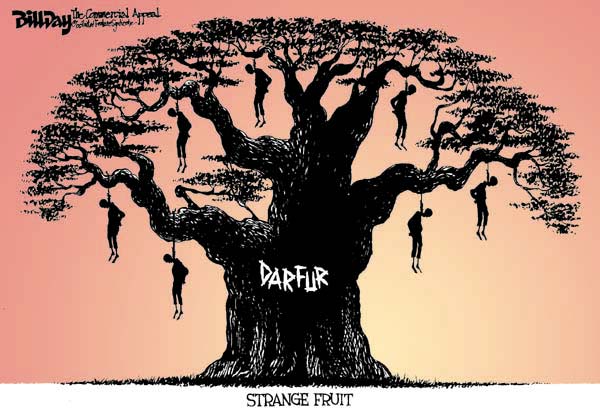
Billie Holiday, nicknamed Lady Day, was a famous African American jazz singer from the 1930s. She was not only known for her vocal style but also for some her songs. One of her most famous is "Strange Fruit".

The song was written by Abel Meeropol, a Jewish man from the Bronx. Since the racial relations were quite hostile in the 1930s due to the incidents of lynching, writing a song condemning lynching was definitely one of the riskiest things to do in the U.S. at that time. He wrote the song in the late 1930s because he was so disturbed by the racism especially after seeing a photo of a lynching.
The lyrics in general compared the lynched bodies to fruit when Holiday sings "Blood on the leaves and blood at the root/ Black bodies swinging' in the Southern breeze". The Southern breeze detail implies that most of these murders occurred in the Deep South which is an area that is known for its hostility towards African Americans. The lyrics add imagery to it in order to imply that the song is about lynching without actually saying it thus making "strange fruit" an euphemism for hanged bodies. It allows the listener to make his or her own conclusions. Holiday's particular voice is very soulful and it evokes sadness and makes the audience believe that lynching is a serious issue.
When I first heard this song in my freshman year of high school, I knew off the bat that it was about lynching. I had already known that lynching was a serious issue in the 1930s but the sadness in Billie Holiday's voice made me feel more implored to do something about it even though these murders occurred more than seven decades ago. Also, the style of the music also affected me because the slow beat and the blues feel to it made me think that this song was going to be dramatic but not necessarily happy or upbeat.
Although this song was produced in the 1930s, it also relates to the Letter from Birmingham Jail written by Dr. Martin Luther King Jr. They are both protesting the unfair treatment of African Americans and they both also showcase ethos, kairos, pathos, and logos. Holiday and King also both used their professions to protest about the treatment of African Americans. Holiday used her talents as a singer to sing about the horrors of lynching and King used his leadership as an activist to convince the entire nation and world that racism was wrong. However, Strange Fruit uses more pathos due to the emotion heard in Holiday's voice while Dr. King's letter is a more of a logos based argument.
- My Keys
